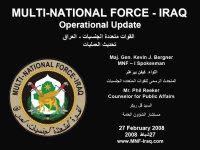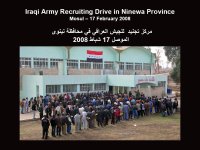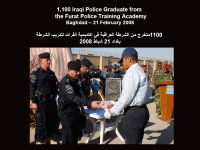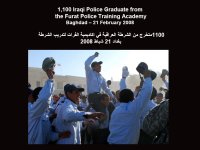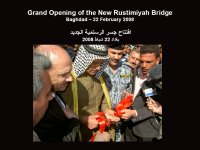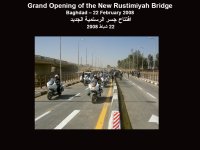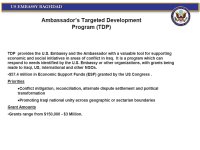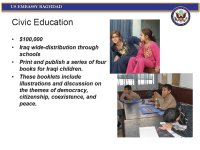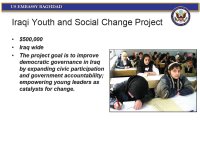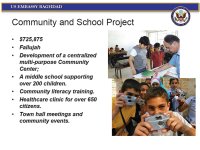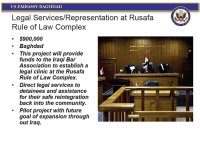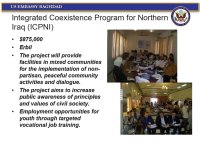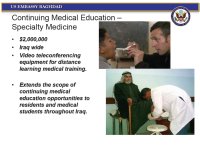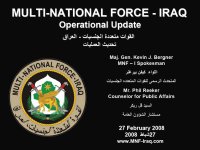
PRESS CONFERENCE: Operational Update: Maj. Gen. Bergner, Mr. Reeker, Feb. 27, 2008
Multi-National Force-Iraq
PRESS CONFERENCE:
Major General Kevin J. Bergner, Spokesman, Multi-National Force – Iraq
Mr. Phil Reeker, Counselor for Public Affairs, United States Embassy – Baghdad
DATE: February 27, 2008
TRANSCRIBED BY: SOS INTERNATIONAL LTD.
PARTICIPANTS:
Maj General Kevin Bergner
Mr. Phil Reeker
REPORTERS:
Owen Watson from The BBC
Courtney Kealy from Fox News
Ahmed Jassem from Al-Arabiya Newspaper
Carlos Hammett[ph] from The AFP
REPORTERS 1-13
*REP1 = REPORTER 1
*INT = INTERPRETER
MAJ GEN BERGNER: As-Salāmu `Alaykum. Good afternoon everyone. I’m joined today by my good friend and colleague, Mr. Phil Reeker, who is the Counselor for Public Affairs with the United States Embassy here in Baghdad. Following my remarks Phil will provide his comments, and then we will be happy to take your questions afterwards. Our coordinated efforts to improve security for the people of Iraq are continuing. From January 7 through February 22, coalition forces have conducted 40 battalion-level operations, detained over 2,700 terrorists, and seized more than 1,400 caches of weapons and munitions. Al-Qaeda in Iraq remains the most significant threat and the most recent example of this is the barbaric attack on Samarra’s deputy police commander of operations, Brigadier Abdul Jabar. On Monday, a terrorist used a bomb hidden under a wheelchair to murder him. This attack on a police station was designed to kill those who are bravely serving to protect the Iraqi people. We honor the sacrifice of Brigadier Abdul Jabar and his dedication to those he died protecting. We will work closely with the Iraqi authorities to help them continue to enforce the rule of law as Brigadier Abdul Jabar had been doing so effectively. And we will also work with them to help bring the perpetrators of this savage attack to justice. Last Sunday, coalition forces captured four al-Qaeda – Iraq leaders in Baghdad. These terrorists were associated with numerous attacks in and around Iraq’s capitol city including the use of car bombs and suicide vests. Also on Sunday, coalition forces mounted an operation targeting Iranian-backed special groups criminals in the Suwayrah area south of Baghdad. The raid resulted in the capture of eight criminals and the seizure of a significant amount of terrorist funds. One of those detained is a financier for those criminal gangs operating in the southern provinces of Iraq. He was also a specialist in rocket and mortar attacks. And his network was involved in attacks on Iraqi and coalition security forces in Najaf, Karbala, Babil, Wasit, and Diwianiyah. In the Sha’ab neighborhood on Sunday, coalition forces detained several criminals including one assessed to be a commander of an Iranian-influenced network that has been dishonoring the ceasefire pledge made by al-Sayyed Muqtada al-Sadr. The detainees were captured with components of explosively-formed penetrators, the most deadly form of roadside bomb. The operations that the Iraqi security forces and our forces conduct against Iraq’s enemies are increasingly enabled by the cooperation of the Iraqi people who are rejecting terrorism and extremism and working closely with security forces to build a more secure Iraq. This past Friday, the actions of some of those courageous Iraqis resulted in the seizure of more weapons and explosives when they helped coalition forces discover five weapons caches near Baqubah. The caches contained homemade explosives, detonation cord, mortar rounds, rocket-propelled grenades, small arms, and ammunition. And the captured munitions were all safely destroyed by explosive ordinance experts. The ranks of those who are willing to serve Iraq and protect their country is also continuing to grow. From February 11th to the 19th, an Iraqi Army recruiting drive in Ninawa Province resulted in more than 2,200 new soldier and officer candidates for the Iraqi Army. Even in spite of two mortar attacks by terrorists during the recruiting drive, the Iraqi security force was able to enlist some 1,300 new recruits and welcomed the return of some 900 former noncommissioned and commissioned officers from the Iraqi Army. As these recruits join the ranks of the Iraqi Army, the ranks of the Iraqi police are also continuing to grow. Last Thursday, over 1,100 Iraqi police recruits graduated from the basic training course at the Furat Police Academy here in Baghdad. During this phase of their training the graduates successfully completed education in law, ethics, crime scene investigation, and weapons. Here is what one of the graduates had to say upon his graduation. “Today’s graduation makes us very happy because this will provide security and control to this area. We are all very excited about it. I joined the Iraqi police because I have seen how much damage the extremists did to our country. And I wanted to provide protection for my fellow Iraqi citizens.” In addition to expanding the ranks of the Iraqi Army and the Iraq police, on Friday, a representative of Iraqi Prime Minister Al-Maliki inaugurated six new health care centers in the Maysan Province in southern Iraq. Also on Friday, Hussein Tahan, the governor of Baghdad Province, presided at a ceremony to mark another sign of progress: the opening of a new Rustamiyah Bridge across the Diyala River. This bridge runs adjacent to the bridge that was closed for five days last May when it was attacked by terrorists using a truck bomb. The planning, management, and construction of the new bridge was completely done by Iraqis with the local government leaders in charge. And with that, I’d like to turn things to Mr. Reeker, with an update from the United States Embassy. Shukran jaziilan.
MR REEKER: Thank you, General. As-Salāmu `Alaykum. Ladies and gentlemen, it’s a pleasure to be back with you once again today to join the General in discussing a little bit about some of the activities at the United States Embassy and our engagement with our Iraqi colleagues here in Iraq. And then I’ll be happy to take your questions on any subjects. I did want to point out, as many of you are aware, that the Dialog on Economic Cooperation is taking place today. Some of you may have already attended this morning’s opening ceremony. And of course, this afternoon there will be closing remarks and a final communiqué. I’m sorry; that’s tomorrow, Thursday, after the second day of this dialog. It is a terrific opportunity for U.S. senior officials from a variety of government agencies and Iraqi officials to get together to discuss different aspects of the bilateral economic relationship including the economic progress that we’re seeing here in Iraq, the U.S. government’s assistance and, of course, encouraging investment within and from outside in Iraq. So there are a variety of interesting discussions on trade, investment, energy, agriculture, and ministerial capacity building. In that vein, I wanted to highlight a little bit for you today some of the American assistance that we have been providing. As you are well aware, the United States people, through our Congress, has provided significant monies for relief and reconstruction in Iraq; both in the security side that General Bergner has talked about including the CERP funds, that’s the commanders’ funds that are available to commanders to provide quick access to small humanitarian relief and reconstruction projects. For instance, in 2007 alone, the CERP fund funded over 6,400 projects. Economic support funds are equally important and Congress has appropriated almost $3.3 billion in economic support funds for Iraq since 2003. Much of that administered by the U.S. Department of State working through our PRTs, the Provincial Reconstruction Teams around the country. With U.S. Agency for International Development, the Gulf Region Division of the Army Corps of Engineers we have been implementing a number of programs with our Iraqi partners. One small program I’d like to highlight today was a program known as the Ambassador’s Targeted Development Program. This provides the U.S. Embassy and Ambassador Crocker with a valuable tool for supporting economic and social initiatives here in Iraq. Congress appropriated specifically for the ambassador’s use, some $57.4 million in economic support funds with our priorities being conflict mitigation, reconciliation, alternate dispute settlement, and political transformation. We tried to work with Iraqi partners to promote national unity across the geographic and sectarian boundaries within Iraq. It’s a small grant program, relatively speaking, ranging with grants from $150,000 up to $3 million, mostly with Iraqi, some U.S., and some other international non-governmental organizations. It can respond to needs identified by the U.S. Embassy or by other organizations including our Iraqi partners that will help to promote what we are working on together here in Iraq. There are a few slides that I’d like to show that illustrate some of the projects that we have funded during the first phase of this targeted development program. And if anybody is interested in further details on those projects, I’d welcome your questions and we can certainly hook you up with specific information on any of these projects. But just to give you an idea of how these…how the projects on a small scale get started and how they can be used to expand to other regions in Iraq or leverage from the original scope of the project with additional investment from outside sources including partnering with Iraqi groups. The first project I’d like to mention and I believe we have a slide to show is known as the Nur Sewing Factory. It’s a $2 million project in Kirkuk. The project is going to train and aid, educate and employ approximately 500 widowed women and single mothers in Kirkuk Province, particularly widows of men who were murdered in some of the violence that we’ve seen in that region. The grant provided to the organization will establish a sewing factory that’s going to purchase necessary equipment and materials and provide necessary funds for the administration, startup, and continued working capital for this project. I will point out that at the request of some of the partner organizations, we’re not mentioning their specific names at this time as they get their projects underway and are concerned about security. The second project I’d like to highlight focuses on civic education. This is an Iraq-wide project with a small grant of $100,000 which will distribute, through Iraqi schools, a series of four books for Iraqi children. The grant will help to print and publish these booklets which include illustrations and discussion on the themes of democracy, citizenship, coexistence, tolerance, and peace. This is the kind of program in terms of democracy building at the grassroots level focused on youth that the United States has pursued in many parts of the world, partnering with local organizations. And we’ve found that to be particularly useful. And this nongovernmental organization that requested this grant would like to use this as a pilot to expand perhaps to another series of books in the future. The third project I’d like to highlight that was approved under the Ambassador’s Targeted Development Program is known as the Peace Calendar Program. An NGO focused on reconciliation throughout Iraq approached us with a plan to print a calendar which will highlight and promote religious coexistence and tolerance specifically focused on the common factors uniting Mesopotamia over the many centuries of history in this region. The calendar is going to emphasize a number of key values that have held together Iraqi society for many years; an active society that believes in and desires real progress and prosperity. And the view is to use this calendar, distributed throughout Iraq, as a reminder to all the citizens of what their heritage can be and how coming together they can work together for a more prosperous, peaceful, stable Iraq. The next project I wanted to note is known as the Iraqi Youth and Social Change Project. Again, working with a local NGO to engage Iraqi young people. It’s a country-wide project with a grant of $500,000. The goal here is to improve democratic governance in Iraq by expanding civic participation and government accountability starting by empowering the young people, those in school now who will be the next general of leaders, as catalysts for change in the future. We believe very strongly that an active youth can play a vital role as part of an empowered citizenry and that’s going to require accountability of government. And this will be a vital aspect of Iraq’s continuing transition into full democracy and prosperity. Similarly, the Community and School Project in the next slide is funding a grant of almost $726,000 in Fallujah. This is a development of a centralized, multipurpose community center; a facility in that community that will provide the community with a middle school for educating more than 200 children as well as a facility for literacy training which will benefit the entire community. It will provide a health care clinic for over 650 citizens as well as a town hall meeting available for events, a facility where the people of the community can come together to discuss aspects of their community—challenges, concerns. Discuss those together and then engage their government in events that can be held at that facility. This is the kind of project that we feel reflects a small thing we can do in a community to help facilitate with our Iraqi partners the kind of dialog necessary for further democratic development. The next project is known as the Legal Services Representation at Rusafa, the Rule of Law Complex here in Baghdad. It is a $900,000 grant that provides funds to the Iraqi Bar Association. And they will establish a legal clinic at the Rusafa Rule of Law Complex. And this clinic will direct legal services to detainees and assist then in their safe reintegration back into the community. This is very much a pilot project that the organizers at the Iraqi Bar Association and we, as the funders, hope we can expand throughout Iraq after we see how this initial project gets going. The Integrated Coexistence Program for Northern Iraq is a project being funded in Erbil. At $875,000, this grant will provide facilities in mixed communities in that province for implementation of nonpartisan, peaceful community activities and dialog. Again, providing facilities that any citizen in the community can use to come together for this kind of dialog and activity to raise community and civic concerns, we believe is a notable and worthy aim. We hope this will increase public awareness of the principles and values of a civil society. And the facility will also be used to provide vocational job training targeted at unemployed youth. Again, an important aspect of the economic development that we work on in that region. And finally, the eighth project funded in this first round of the Ambassador’s Targeted Development Program is the Continuing Medical Education Program focusing on specialty medicine. This is a $2 million grant under the program. It will be Iraq-wide in scope and it will provide state-of-the-art video teleconferencing equipment for distance learning and medical training allowing Iraqi doctors in every corner of the country to keep up with the latest practices, to engage with their colleagues in other parts of the country or, indeed, from abroad on the latest trends in medical education. This will help residents, medical students throughout Iraq as well as practicing doctors to continue to burnish their credentials and to provide the best care for the Iraqi citizenry. So with that, just a sort of little overview of the first eight projects funded under this particular program managed in the U.S. Embassy. I would point out also that the second round of solicitation has been placed. We’ll be looking at proposals submitted by NGOs. We use all of the sections of our embassy and our colleagues around the country, the Provincial Reconstruction Teams, to push out notification about this program. And those NGOs that have experience or good ideas and perhaps already have successful endeavors in place can approach us. And we evaluate then, through a committee within the embassy, proposals that will be worthy of this kind of grant support. Again, that’s just one small piece of our assistance program working together with the people of Iraq for their betterment. And if there are any questions on this or people would like to follow up on individual projects, we would be happy to set you up with those organizations. With that, I think the General and I are prepared to take questions on this or any other topic.
MAJ GEN BERGNER: Yes, sir.
REP1: Owen Watson; BBC. General, in your opening statement you twice mentioned Iran: Iranian influence or Iranian backed. About a year ago the coalition held a news conference in this very room where you displayed munitions which you said came from Iran with, you know, the markings and all that. Is there…over that 12 months, is there any sign that you’ve been able to stem the flow of those munitions coming into Iraq?
MAJ GEN BERGNER: Yeah. Owen, you raise a good point. And let me start by pointing out first of all that in the last ten months or so, since I’ve been working with many of you, we have been very forthcoming and very transparent in identifying where we could what we believe to be the source and the system of support for weapons, training, funding and, in some cases, even tactical direction that various extremist groups in Iraq have received from external sources. And we know that also…we know that in particular the special groups rely on the Iranian Revolutionary Guard Corps’ Quds Force for a significant amount of that effort. In this very room, on a slightly different table but in this same forum, I’ve put five-array, three-array, two-array explosively-formed penetrators here that we have captured during the course of our operations. We have shown you mortar rounds. We have shown you large fragments of 240 millimeter rockets. We have shown you advanced rocket-propelled grenades. And so those are the signature weapons that we know, in the case of the special groups, that they rely on external sources to help support them with. The Government of Iran has made a commitment to the Government of Iraq at the highest levels to help improve the security and the stability inside Iraq and we look forward to seeing them fulfill that commitment. We also look forward to the opportunity to discuss with them—in the forum that you have followed closely, these tripartite talks—specifics on how they could contribute to an improvement in security here. And we look forward to hearing from them whether or not there is a reduction in the flow of weapons. And so that is something that we’re still assessing. And something that we would look forward to discussing with them during the course of those talks. Courtney.
REP2: This is a question to Phil. How much malign influence does Iran have within Iraq’s political parties?
MR REEKER: I think that’s probably a question that’s somewhat subjective. What we have focused on—indeed, in our tripartite talks with the Iranians and the Iraqis, which are hosted by the Iraqis, which take place at the request of the Government of Iraq—is security in Iraq. And as General Bergner just outlined, as Ambassador Crocker has discussed many times with many of you, we have had grave concerns about Iranian behavior that does not contribute to security in Iraq. In fact, leads to some of the violence that we have seen all too often. That, again, is the subject of our discussions when we do sit down in the three-way talks. As Ambassador Crocker has said, Iran has demonstrated their ability to cause very grave damage to Iraq. And I think the Iraqi people are also aware of that. We’ve seen that evidence. We’ve talked about it here as General Bergner pointed out. I think Iraqis are very focused on their own future. And their engagement with Iran is something that is up to them. Iran and Iraq are neighbors. They will have a relationship. They need to have a relationship. What is important to us, and I believe to Iraqis, is what Iran can do to contribute to stability and security and prosperity in Iraq. I think it’s very clear to anybody that it is in Iran’s long term interest…strategic interest that Iraq be a stable, prosperous, secure, and democratic country. And that is certainly what we call for. And if you look at Iran’s stated policies, that’s what they should be contributing to as well. What we haven’t seen so far is that their activities actually are in line with their stated policies. And that, in fact, is what we continue to call for.
MAJ GEN BERGNER: Yes, sir.
REP3: Asks question in Arabic.
INT: Question from Al-Mehda[ph] Newspaper. I hope that one of you asks this question. Yesterday I’ve seen the reports that say that the American organizations that work in Kurdistan may leave Kurdistan region due to the Turkish incursion because the Turkish forces are going nearer and nearer, further and further in the Kurdistan soil. And as we’ve seen that the Turkish forces said the operations will be limited. So what if this didn’t happen? What if the operations exceeded? And what if they are not limited? What will happen? And what is your response to that?
MR REEKER: I’m not sure that I’ve seen the specific reports that you’re referring to. However, I can say that I’m not aware of any reports of American organizations or other international organizations making any plans to leave Iraqi Kurdistan. We have diplomatic personnel, of course, there through our regional embassy office in Erbil, through our Provincial Reconstruction Team. We work very closely with local authorities on some of the types of projects…economic development projects that I outlined just a few moments ago. Those things continue. And so I’m certainly not aware of any change in our official consular recommendations as far as Americans, American citizens, or American organizations present in the Kurdish regions of Iraq. And I think we’ve made very clear from Washington, you’ve heard officials talk about our view of the Turkish activities, the need for dialog between Turkey and the Government of Iraq. We welcome that. As Secretary Rice has said, the Turkish operation against P.K.K. terrorists ought to be of the shortest duration possible. We certainly encourage the contacts between the Government of Iraq and the Turkish government and that’s what we will continue to do. You’ve seen remarks by Secretary of Defense Gates who is in Turkey today and will be delivering the messages that he’s described.
MAJ GEN BERGNER: Yes, sir.
REP4: unintelligible] Agency. [unintelligible] expecting a visit of the Iranian president here in Iraq. Would you be any role for the embassy in this visit or sending messages or preparing for next meetings for that? Thank you.
MR REEKER: Sir, I don’t believe there really is an embassy role. This is a bilateral visit between the presidents of one sovereign country, Iran, at the invitation of another sovereign country, Iraq. As I noted earlier and as Ambassador Crocker has said, these two countries are going to have a relationship; they need to have a relationship. What we are interested in—and we have no role in the visit itself. What we’re interested in is the substance of the visit and what is it that President Ahmadinejad can say to the Iraqis about what he and his government and his country will do to help Iraq with security to ensure a stable, secure, democratic Iraq which, as I noted before, is what Iran should want over the long term. And not a destabilized society fomenting chronic security problems which is what we’ve seen, unfortunately, from Iranian behavior up ‘til now. So we have no particular role as an embassy in this visit. I’d refer you obviously to the Government of Iraq for any details on the visit.
MAJ GEN BERGNER: Yes, sir.
REP5: Ahmed Jassem; Al-Arabiya. Asks question in Arabic.
INT: I have two questions. The first question is the American Congress expends millions of dollars to revive the economy in Iraq in order to develop the economy in Iraq. And we know this and we thank you for this. The money that has been disbursed on the projects inside the country in Iraq; is it being taken from the Iraqi government or is it taken from…or is it a support from you? The second question. The Iraqi citizen is demanding from you since you said you are offering help, asking you to build some residential complexes as well as part of the projects.
MR REEKER: Thank you for your question, sir. And I hope my earlier remarks regarding, for instance, the Ambassador’s Targeted Development Program may be of interest for you. And we would be happy to provide you further details about the broad totality of our assistance program. Let me make perfectly clear that the programs that I outline and discuss are monies from the American taxpayer. These are monies provided through funding by our Congress on which a variety of U.S. government agencies and NGOs, non-governmental organizations, we fund help support these projects for the benefit of the Iraqi people. We do sometimes partner with the Government of Iraq which provides then its own funds for particular projects. As you know, for instance, we have provided money for vocational training and educational purposes in the transition of the CLCs, the people who have participated in those organizations. And the Government of Iraq has contributed money, allocated money for that purpose as well. But our programs, those programs that we describe that we can make available to you in great detail are monies coming from the people of the United States. Your question about housing is one I don’t have any specific information on. Obviously that is a sector that is of importance to the Iraqi people and also to the economy of Iraq. It’s…housing and housing development and construction is an important area for economic development and growth. I’m sure it may be a topic that is discussed over these two days during the Dialog for Economic Cooperation. But I don’t have any specific information on housing programs for you. I’d be happy to look into that for you, however.
MAJ GEN BERGNER: Yes, sir.
REP6: [unintelligible] from National Public Radio. I just had…could you just explain to us…I mean what is the situation now in Anbar? I mean why this big…what called…between the Awakening Council and the Islamic Party? Because the Islamic Party has been like years, you know, ago in Anbar. These things, I mean, the Awakening want to like push out the Islamic Party from Anbar. Thanks.
MR REEKER: Hmm. I think that’s…your question may be an interesting one. I am not particularly familiar with what you’re referring to. And I think you want the general to answer your question so I’d be happy to toss it his way.
MAJ GEN BERGNER: Sounds like a political question from here…
MR REEKER: Yeah, yeah.
MAJ GEN BERGNER: …but I’ll start. You know, first of all, I think you have to start…in any discussion about Anbar, you have to start with a sense of the courage and the decision that the people of Anbar have made to reject the violence and the corrupt ideology and the oppressiveness of al-Qaeda and restore their province to a state of stability and security. And it has been—I think by all accounts—remarkable in terms of the change and the period of time that that change has taken place. The Awakening leaders, the tribal leaders have been a central part of the leadership in helping the citizens of Anbar make that choice. They have also been a central part of the leadership in helping encourage the sons of Anbar, the sons of the tribe, to join the legitimate security forces of Iraq and commit themselves to work within the rule of law and within the government both at the provincial and at the national level. And so they have taken significant personal risks, shown great courage. And the results that have been achieved in Anbar as a result of that courage obviously, in conjunction with the Iraq security forces and with very brave and selfless service on the part of the coalition forces, has led to the circumstance now where those tribal leaders are considering how they continue to interact with the government and whether they involve themselves in a political organization of some sort which clearly, in the country of Iraq today, is the right of all citizens. And so I’m not sure that I would suggest there is a displacement going on in the political structure as much as I would say there is an evolution. There’s an evolution that’s a natural result of the improved security situation, a desire to help the people of Anbar move forward. And so now there is a discussion among leaders that is no longer about security per se, it’s now about the politics of who will lead Anbar and how the different parties will interact and organize themselves. And as a soldier I would tell you that’s something that’s encouraging because that’s what this country has sacrificed so much to achieve is to be able to participate and decide what their political structures will be and how they will interact. And so I would…that’s the characterization that I’d offer you about the evolution that continues in Anbar today. Shukran.
MR REEKER: As a diplomat, I would just add that that’s exactly the kind of thing that diplomacy encourages: engagement, dialog, working together, finding accommodations. And that’s what we’ve seen in the political process in recent weeks and months here in Iraq. The passage of legislation. The ability of politicians to have heated, difficult discussions but to come to agreement to move forward realizing that politics is not a zero sum game and that there has to be this kind of dialog. I think we’ll see more of this in Iraq with local elections which the…which we expect to take place later this year in Iraq. And so I think it is a very positive development for all of Iraqis. Thanks.
MAJ GEN BERGNER: Yes, sir.
REP7: Asks question in Arabic.
INT: Question from [unintelligible]. This is a question about the Air Force, the Iraqi Air Force, and the preparations that the Iraqi Air Force is doing and the arming and the helicopters. And what are the future plans to further develop the Iraqi Air Force so that they can take over…assume more control? So could you give us a brief summary of all this? Thank you.
MAJ GEN BERGNER: I will. One of the most important components to a successful counterinsurgency effort is the intelligence, the surveillance, and the reconnaissance capability that augments the ground forces that are conducting that counterinsurgency campaign. And one of the most important things for the Iraqi Army at this point is to have increased capability in terms of those, what we call ISR, or intelligence, surveillance, and reconnaissance platforms that are airborne. The Iraqi Air Force is developing that in a very progressive and sequential way with light aircraft that are well suited for the reconnaissance and surveillance mission. They are now—as we have shown you sometimes here in this update, in fact—they are now patrolling some of their key infrastructure. They are also helping surveil and provide reconnaissance along their borders. And there are now Iraqi helicopters that are providing direct support to ground forces in terms of air mobility that they did not have before. And so there is a good developmental effort underway to provide increasing support to the Iraqi Army forces on the ground at the same time that they mature their own flight training school which is underway in Kirkuk. And at the same time that they develop their own air traffic control capabilities which our Federal Aviation Administration is working with the Iraqi Air Traffic Control System to help develop further. And so you’re seeing a growth both in terms of the Air Force and its capability. You’re seeing a growth in their training, their own internal training capability to train Iraqi pilots here in Iraq. And you are also seeing the maturation of their own air traffic control capability. All of which will eventually get to the point where Iraqi airspace and Iraqi aircraft are the ones being flown and controlled by either Air Force pilots or air traffic controllers. So there is a great deal of progress underway. And obviously still a great deal more work to do. And I left out the air cargo capability that now exists, on a limited scale certainly with just three C-130 aircraft, but I increasingly see those aircraft moving Iraqi delegations and sometimes the media as well to Iraqi events around the country. So a great deal of pride but a great deal of work yet to do, certainly, in terms of helping it develop. Shukran. Yes, sir.
REP8: Hi. Carlos Hammett[ph] with The AFP. With all this talk about, you know, Iran supporting special groups and possibly smuggling weapons, who exactly in Iran is behind this? And is it a deliberate government…a deliberate policy of the Iranian government to do this?
MR REEKER: Clearly that is a question that you need to ask the Iranian government. I think Ambassador Crocker has been very clear that we are, as he said, “Modest in suggesting our understanding of the machinations of the Iranian government and why perhaps they do what they do.” I think we have been also very clear in discussing the IRGC and the Quds Force in particular for their role in supporting the malign activities which have caused so much destruction and trouble in terms of security in Iraq. That’s been the topic of our discussions on security in Iraq and will continue to be a focus of that. But to understand why Iranian behavior would not match their stated policies, I think you need to direct that to Iranian officials. Sir.
REP9: General, in your opening statement you described al-Qaeda in Iraq as remaining the number one threat. As a military man, where does Iran sort of fit in in terms of your targets or sort of priorities or threat to your operation here?
MAJ GEN BERGNER: Yeah. Well, we have said for some time, and I think it remains just as true, that the threat in Iraq is much of a mosaic and there are different components that are undermining the security and stability of the Iraqi people. The Iranian-sponsored special groups are certainly an important component of that. Al-Qaeda in Iraq, however, remains the main threat to overall security and stability. And they continue to have and to seek the spectacular attack if you will, the barbaric attacks that are the most likely to incite sectarian strife. And so because that remains their purpose and their focus and their overall purpose, as you know, in their own words, has been to turn Iraq into a caliphate, to subjugate the Iraqi people and the country of Iraq to their own corrupt ideology. And that is continuing to be the main threat overall in the security situation in Iraq. Thanks. Yes, ma’am.
REP10: Asks question in Arabic.
INT: Question from Rose[ph] Baghdad to General Bergner. We cannot deny that the Iranians are supporting terrorism. But al-Qaeda here, why don’t…why we always deny the…those who support al-Qaeda because al-Qaeda is being supported by several people? Because those people, in turn, want to destroy the United States. So who’s supporting al-Qaeda and why do we forget Al-Kuwait? Because they want to destroy Iraq because of what they did back in 1991. And there are several people are now backing al-Qaeda but you are not mentioning them…al-Qaeda that is. I know what al-Qaeda is. And we know what al-Qaeda is. But who is backing al-Qaeda? Is it Syria? Is it Kuwait? Sudya[ph]? Who? Afghanistan? Or some other foreign countries that recruit fighters like in Netherland, in France. So why don’t we just go and look for those who motivate and pay for those people? Al-Qaeda is a limited organization. So why don’t we just seek those people who supporting them? And we should remember that Kuwait has a role in supporting al-Qaeda as well because what Iraq has done in 1991. Iran as well. Yes. I do say that Iran. Yes. Iran, al-Qaeda, Al-Kuwait. All those countries who support Iraq are. So I think we should…
MAJ GEN BERGNER: Okay.
REP10: Continues speaking in Arabic.
INT: …concentrate on all those countries that support al-Qaeda because they aim to destroy Iraq.
MAJ GEN BERGNER: I definitely got your question. And let me just offer a couple of thoughts because you raise a good point. We have talked and it remains important to continue to discuss the foreign sources of support that al-Qaeda – Iraq depends upon. In fact, if you recall the Sinjar papers that we discussed here. In fact, we showed you over 800 different files that were captured of al-Qaeda terrorists who, different elements supporting al-Qaeda, were trying to move into and around not just Iraq, but throughout the Middle East. So we have learned a great deal about the sources of support that al-Qaeda depends upon in order to conduct their operations here in Iraq. Our operations focus not only on the internal structures of al-Qaeda in Iraq, but the rest of our government works very closely with other nations who have the capability to help undermine the al-Qaeda movements—that are either source countries or are transit countries. To that end, we have shared what we have learned about the al-Qaeda structure, about their networks, about the origin and the transit points with our friends throughout the Middle East. And we have sought each of their government’s support to help curtail the flow of fighters and the flow of other resources whether it be financing or otherwise that is necessary for the al-Qaeda terrorists to conduct their operations. We have seen some improvements. We have talked about some of those improvements at neighboring…steps that neighboring countries have taken to make it more difficult for a certain profile—military-aged males—to depart and go on one-way tickets, for example, to Damascus which we know is one of the most important transit points that they rely on in getting into Iraq. But it’s not just the neighboring countries. It’s the countries around North Africa; there are countries in Europe. All of them are being used by al-Qaeda in some fashion, many of them are, and al-Qaeda is dependent upon their ability to move through those countries as well. So it is a transnational threat. It is one that has a number of different sources of support which we are cooperating very closely with on an international basis to help reduce those…the access that al-Qaeda has from each of those countries. Shukran.
REP11: Asks question in Arabic.
INT: Question from [unintelligible] News Agency. Question to General Bergner. Could you give us details about…? I’m sorry. I can’t hear the question. Oh. This is on a question about the operation in Mosul. There are some reports that the Peshmerga are doing some detentions. I’m sorry. I couldn’t get the whole question.
MAJ GEN BERGNER: Well, I got part of your question.
INT: Yeah. Well, if you could just repeat it.
MAJ GEN BERGNER: Could I just ask you to repeat it because the interpreter didn’t…wasn’t able to hear it…hear the whole thing?
UNIDENTIFIED: Speak right into the microphone.
MAJ GEN BERGNER: I want to make sure I address exactly what you are asking.
REP11: Repeats question in Arabic.
INT: How do you…could you please tell us about details about the situation in Mosul and what’s going on there? There are some reports saying…or some speculations that say that the Peshmerga are making…or pursuing the Turkmens in Iraq after the Turkish invasion.
MAJ GEN BERGNER: Hmm. I understand your question. Thank you. Our forces and Iraqi security forces are engaged in a range of operations in Ninawa Province that are targeting al-Qaeda, Ansar al-Sunna, the other associated extremist groups that are destabilizing Ninawa Province in particular. And they are focused on those threats. General Riyadh, who now leads the Ninawa Operations Command in Mosul, is working closely with the 2nd Iraqi Army Division and the 3rd Iraqi Army Division commander, General Korshid[ph], to focus those operations. And our 3rd Armored Cavalry Regiment is working very closely with him and the Iraqi police commander now, Major General Wathik, to focus those operations on those kinds of threats to stability in Mosul. And that is where their focus is. It’s on those who are destabilizing and intimidating, conducting murder, kidnapping operations, and seeking to undermine the rule of law in Mosul. Shukran. Yes, sir.
REP12: With regards to the Turkish incursion, I mean we understand the U.S. position that they want the operations to be as short as possible, but at what point is it…has Turkey stayed too long? At what…how long is too long? And if that point is reached, how will the U.S. be able to help resolve this situation? What could we expect?
MR REEKER: I really think, as I indicated, you’d best look into the statements that have been made by the most senior levels of the U.S. government in Washington. Secretary Rice has discussed this and, as you know, Secretary Gates is in Turkey or on his way there today. He’s already talked about what he will be saying to our Turkish interlocutors. And I think I wouldn’t want to try to pre-empt or take away the news from there which is where you should be looking at that. But clearly, as we’ve made clear on a number of occasions, we believe the operations should be of the shortest possible duration. And as I said earlier, we’ve encouraged the kind of dialog that we’re seeing between Turkey and Iraq on this matter. The P.K.K. terrorist organization remains the enemy of all of us—of Iraqis including the people of Iraqi Kurdistan, and Turks, and as well as the United States. So the messages I think are quite clear and I would refer you to Secretary Gates and his conversations in Turkey.
MAJ GEN BERGNER: Last question. Yes, sir.
REP13: Thanks. Just a quick follow up on that. You mentioned the importance of the dialog between the Turkish government and the Iraqi government to try to resolve this situation. Is there a role that the embassy is playing in trying to foster that dialog in terms of creating opportunities for the sides to come together and resolve these issues?
MR REEKER: I think that’s very much happened between the Government of Turkey and the Government of Iraq. There are contacts. As you’ve already been aware, a delegation from the Turkish government [is] in Baghdad today. Turkey and Iraq are neighbors. They are friends. They need to keep in close touch on these kinds of matters. Certainly, as Secretary Rice has said, we do whatever we can to facilitate that kind of dialog. And the fact that senior leaders are visiting Turkey today is part of that process. But as you’ve seen the two governments already are very capable of having that dialog. And that’s an important part of dealing with the kind of common threat that we face from terrorist organizations.
MAJ GEN BERGNER: I want to thank Phil Reeker for joining us today and for providing a great sense of what our battle buddies or wingmen are doing on the nonkinetic side of the strategy to help improve the circumstance here in Iraq. And, Phil, thank you very much.
MR REEKER: Always a pleasure.
MAJ GEN BERGNER: Shukran jaziilan. Ma’salama. Thank you.
|
NEWSLETTER
|
| Join the GlobalSecurity.org mailing list |
|
|
|


